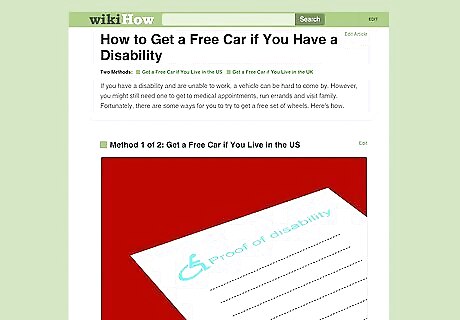
views
X
Research source
. That is one out of every 25 Americans. If a major portion of your income comes from such disability benefits, then it can be tough to finance a new or used vehicle. Lenders are reluctant to lend to borrowers living off disability because this income cannot be garnished if payments are not made as agreed, putting the lender at a significantly greater risk in this lending scenario.

Check your credit report 3-6 months ahead of time. It is important to have the cleanest credit history possible when applying for any loan. When you're faced with the need to overcome a possible roadblock like disability income, this is even more important. By giving yourself six months of lead time, you can dispute any errors that may be marring your credit long before you apply. After all, the credit bureaus have 30 days to investigate each credit dispute.

Demonstrate non-SSDI income. Most auto lenders require a minimum monthly income of $1500 in order to approve you for a car loan, or $375 per week . If you can offer sufficient proof of income from sources other than disability insurance, this will increase your odds of approval. The greater this income, and the longer your history of earning it, the better your chances.

Demonstrate "situational" bad credit. If you have recent problems on your credit report such as late or missed payments, there is a good chance these are due, at least in part, to the medical hardship behind your disability. Communicating this to your lender shows that your credit problems are acute rather than chronic, thereby increasing your chances of an approval.

Get a co-signer for the loan. If you are able to get someone to co-sign your auto loan, the lender will look at their ability to repay the loan completely on their credit and income. This obviates the disability income problem. However, the co-signer must have sufficient income and credit and repay the loan on their own, and their credit will be impacted by your success or failure in making payments on time.

Choose a reasonably-priced vehicle. If you look at the average price of each new car sold in the US compared to the average income, Americans spend more than 70% of their cars as a percentage of annual income. This is much too high, as most personal finance experts recommend purchasing a vehicle that costs just 30-35% of the amount you earn each year. By going to your lender with a reasonably-priced vehicle, you lower the risk inherent to your loan and increase your odds of approval.

Try to get a free car through charity. If all else fails and you desperately need a car, there are a number of charities that provide donated cars to individuals or the families of individuals who are disabled. Application criteria vary depending on the charity. You can learn more here: Get a Free Car if You Have a Disability.



















Comments
0 comment